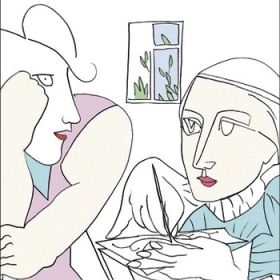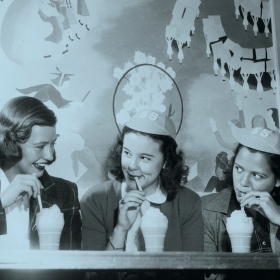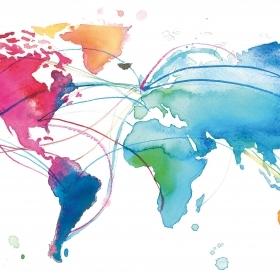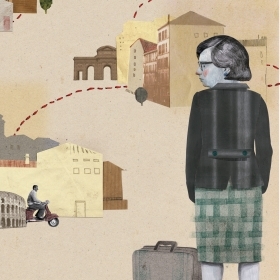In this slim book, two old friends—one a writer (American, in her 70s), the other a painter (French, in her 90s)—engage in a series of conversations about the Big Imponderables: creativity, literature, art, war, womanhood.

Lisa Reed Alther ’66 and Françoise Gilot
About Women: Conversations Between a Writer and a Painter
Doubleday,
56 pages, $25.95
In this slim book, two old friends—one a writer (American, in her 70s), the other a painter (French, in her 90s)—engage in a series of conversations about the Big Imponderables: creativity, literature, art, war, womanhood.
The writer is Lisa Reed Alther ’66, whose first novel, the raucous and ribald coming-of-age story Kinflicks, was a feminist “It Book” when it came out in 1976, a decade after her graduation from Wellesley. Nobel laureate Doris Lessing pronounced Alther “a strong, salty, original talent.”
The painter (and noted printmaker) is Françoise Gilot, whose work is owned by museums around the world. Her 1964 memoir, Life with Picasso, based on her 10-year relationship with Pablo Picasso, 40 years her senior, was a bestseller. The only woman ever to leave him, Gilot still paints to this day.
Friends for a quarter century, both the women look at the world from wildly divergent pasts: Gilot from the glamour and culture of cosmopolitan Paris between the two world wars, Alther from the outdoorsy life of a wealthy doctor’s daughter in an Appalachian factory town in Tennessee during the Cold War.
But both were tomboys as children, and each shared the great good luck of being the lone daughter of intelligent mothers; each had interested, compelling grandmothers who loomed large in their lives. Their men—fathers, grandfathers, husbands (Gilot married twice after leaving Picasso, painter Luc Simon and polio vaccine developer Jonas Salk)—play decidedly background roles.
Whether the two are discussing the big questions, or smaller ones (the importance of the little black dress, or their shared horrors of white-dress ceremonies like first communions, coming-out parties, marriages), they are always engaged and engaging. Not surprisingly, their “fashion” discussion has nothing to do with hemlines. It’s about psychology, family ties and feuds, economics, creativity, self-knowledge, and women’s place—and power—in the world.
When Alther was a child, she says, “Womanhood looked like slavery to me.” For Gilot, “It looked strange and distant, and performing the part was a comedy,” but at 15, she realized that “all of a sudden the boys were eager to dance with me.”
“So it was a source of power, female power?” Alther asks. “Exactly,” Gilot says. “So I adopted that side of myself. I became an actress; I identified with the part.”
The book’s title may be stuffy; the two women’s lively conversations are anything but. Come eavesdrop.
Butturini is a former foreign correspondent and the author of Keeping the Feast, a memoir about a family’s brush with mental illness, told through food.


